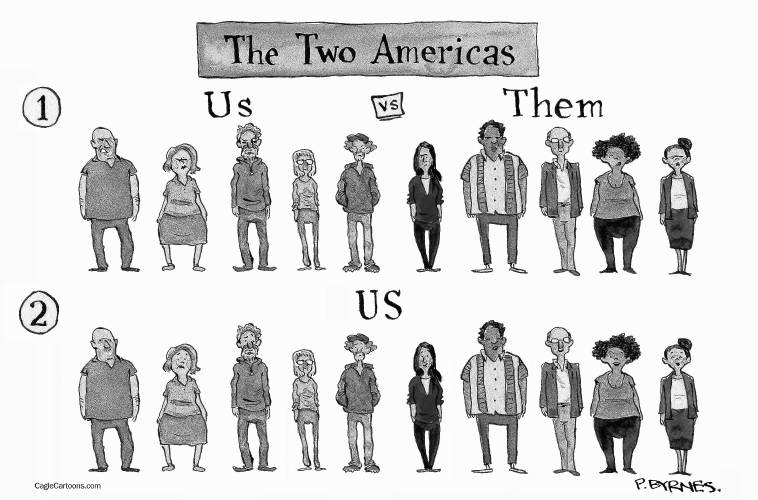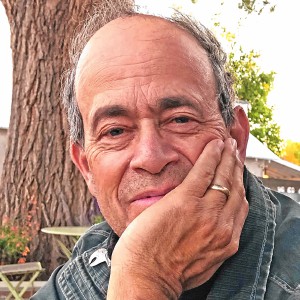My Turn: First, they came for the idea of the common good

—
| Published: 03-28-2025 12:59 PM |
My academic training taught me to be suspicious of broad generalizations about whole societies. Anthropology is committed to fine-grained analyses of cultural and social patterns at the local level. Still, there are times when wider truths emerge from a combination of fact and intuition. Such is the case when scholars and cultural analysts have reflected on a fundamental tension in the American character between individualism and a concern for the collective good.
On one hand, we have a deep tradition of holding each person responsible for whatever choices they make, and we assume that failures are the logical consequence of this free will. This idea has been passed on in the myths of the rugged cowboy overcoming odds conquering the frontier and the “rags to riches” story of Horatio Alger. Any number of Hollywood productions feature the narrative of the underdog who triumphs despite the odds by the force of individual determination.
The competing thread running through Americans’ sense of themselves holds that we have a shared responsibility for each other, expressed in the moral that “no man [or woman] is an island.” When disasters strike, when catastrophic illnesses hit, when violence at home or abroad threatens a population’s well-being, Americans respond with generosity and compassion.
Think of donations of supplies and labor after destructive storms and fires or GoFundMe campaigns to help strangers pay health care bills or volunteers for organ transplantation and blood drives. Both religious and secular organizations embody the charitable soul of America.
It is only when the balance between these two impulses gets out of whack that real trouble results. When individualism is blind to structural constraints like racism and sexism that impinge on the ability to pursue dreams, a valuable stress on personal responsibility becomes a pernicious blaming for circumstances beyond an individual’s control. One cannot pull themselves up by their own bootstraps if their shoes are stuck in cement they didn’t pour.
Likewise, compassion and a concern for others can be taken to unfortunate extremes. When our charitable impulse is misdirected, either unintentionally or with malice, it can become fertile ground for insulting condescension or even outright fraud. Sometimes “thoughts and prayers” turn into an excuse for inaction. There are whole industries, like some megachurches and phony charities, that turn caring into unconscionable profits without real benefit to those in need. Fraudsters prey on our goodwill to others.
The scope of the damage done when an imbalance occurs between these elements of the American character depends on who is taking advantage of the disturbance. A single prejudiced employer who applies false notions of inherited ability to discriminate against an applicant based on the color of their skin or their gender harms that person, but unless this behavior is widely shared the scope is narrow.
Article continues after...
Yesterday's Most Read Articles
When a vile ideology built on ignorant generalizations spreads, it can have society-wide repercussions. Think of the institution of slavery and the KKK, or routine denial of opportunity to women or violence against gay citizens.
When a disreputable pastor makes off with congregants’ contributions there can be a loss of faith among the community of believers, but little impact beyond. When organized crime promotes scams that promise humanitarian assistance but never deliver, there is a wider net of victims and a broader disillusionment.
Our ability to feel kindness to others can be diminished when large-scale frauds cause us to withdraw into a cocoon of suspicion. False accusations, like misinformation about government programs that help the poor, feed into a spiral of callousness that calls into question the very definition of compassion.
We are living the worst-case scenario in which both national and local politics are dismantling the balance between individualism and shared responsibility. Leaders are institutionalizing hatred and mistrust behind a curtain of rhetoric and lies about the deserving and the undeserving.
Citizens who might otherwise care about their neighbors are fed such a steady diet of misinformation about “waste, fraud and abuse” that they come to assume the worst, and privilege what they have been led to believe is their own self-interest over the pursuit of an equitable social order. Most distressing is that this campaign of an “us versus them” mentality is actually little more than a smokescreen for policies and practices that reward the wealthiest at the expense of the vast majority of hardworking citizens.
America has gone through similar destructive periods before, as in the decade before the Civil War and the lead-up to the Great Depression. Only mass resistance and concerted political action put the country back on a path toward a balance between productive individualism and the pursuit of the common good. That is the movement that the present moment demands.
Donald Joralemon, emeritus professor at Smith College, lives in Conway.






 My Turn: The latest ‘white backlash’
My Turn: The latest ‘white backlash’ My Turn: GCC and the rare Jurassic armored mud balls
My Turn: GCC and the rare Jurassic armored mud balls Walt Gorman: Enjoyed report on pot industry’s struggles
Walt Gorman: Enjoyed report on pot industry’s struggles Sarah Shevlin: Help fund lung cancer research
Sarah Shevlin: Help fund lung cancer research
